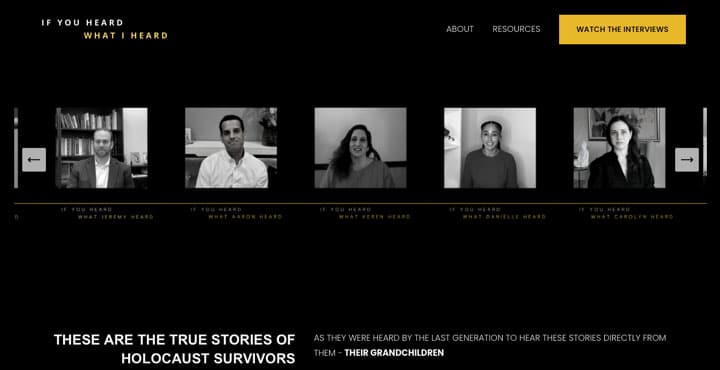 Courtesy Carolyn Siegel
Courtesy Carolyn Siegel When the riots were happening in Los Angeles last year, Congregation Beth Israel was vandalized with anti-Semitic graffiti. For Carolyn Siegel, this event was a tipping point. It was the fifth or sixth anti-Semitic incident she’d heard about in the past year, and she had enough.
Siegel remembered what her grandfather, a Holocaust survivor, made her promise when she was eight years old: that her generation would not forget the Holocaust. “It hit me in that moment that I had to do something,” she said.
She came up with idea of recording Holocaust survivors’ grandchildren telling their grandparents’ stories. Although Steven Spielberg had already recorded many survivors through his more than 3,000 USC Shoah Foundation interviews, Siegel wanted to make something that would be more accessible to people in her generation, who may not have the attention span to sit down and watch these long-form films.
“I feel very grateful that Spielberg captured those survivors’ stories,” Siegel said. “But now, it’s 30 years later, and the world is starting to forget. Something had to be done so that these stories would resonate for today.”
“Something had to be done so that these stories would resonate for today.”
She added, “Maybe if you hear my story and the interviews I captured in the shorter form, you’d be interested to watch a longer one from the survivors themselves.”
Even though Siegel had no prior filmmaking experience, the LA native and Milken Community High School alumna set out making the short films. She asked on social media if anyone wanted to participate and received over 12 responses within 24 hours. Two participants are Siegel’s friends and former co-counselors from Camp Alonim.
To capture everyone’s stories, she filmed 15 interviews remotely between December of 2020 and this past March, releasing them on April 7, the day before Yom HaShoah. Each of them is around 15 to 30 minutes long. The project, titled “If You Heard What I Heard,” can be found on Siegel’s dedicated project website. Clips from it are on the project’s Instagram as well.
In her own recording, Siegel talks about her grandfather, Moses Locker, who joined the Polish Army to avoid Nazi persecution. He lost his entire immediate family in the Holocaust and ended up meeting Siegel’s grandmother, Leah, in a displaced persons camp in Germany. From there, they emigrated to the United States and rebuilt their lives.
“While the stories captured in these interviews, including my own, are difficult stories of loss and destruction, what those watching will also hear are stories of hope, resilience and strength,” said Siegel.
Kylie Ora Lobell is a writer for the Jewish Journal of Los Angeles, The Forward, Tablet Magazine, Aish, and Chabad.org and the author of the first children’s book for the children of Jewish converts, “Jewish Just Like You.”























 More news and opinions than at a Shabbat dinner, right in your inbox.
More news and opinions than at a Shabbat dinner, right in your inbox.